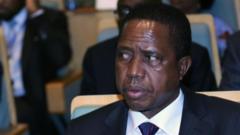Amid the ongoing reformation of Syria's governance structure, mistrust among Kurdish citizens towards the new leadership reflects deep-seated fears and historical grievances.
Kurdish Skepticism Towards New Syrian Government Persists

Kurdish Skepticism Towards New Syrian Government Persists
Despite agreeing to merge with a national army, Kurdish communities are wary of the new government's intentions and history.
In the aftermath of Syria's civil war, the situation remains tenuous in the northeastern regions predominantly inhabited by the Kurdish population. The Kurdish-led force, which has effectively governed this area, recently consented to integrate into a new national army proposed by the rebel factions that have now assumed control of Syria. Nevertheless, this development has not quelled the suspicions harbored by many Kurdish residents.
Amina Mahmoud, a 31-year-old Kurdish woman from Kobani, articulately expressed these concerns, asking, "How can we trust this new government in Damascus?" Her sentiment resonates throughout the community, as many who were once embroiled in conflict with these rebels now find themselves needing to collaborate for the sake of political stability. Additionally, the history of the rebels' connections to Al Qaeda and their current alliances with Turkey—an entity that historically has opposed Kurdish empowerment—complicates matters further.
Recent interviews conducted in late March with residents from the northeastern expanse highlight that Kurdish distrust is not confined solely to historical context but extends to the current political climate. The recollections of the past and the emphasis on autonomy raise significant questions about representation and inclusion under a centralized authority. The diverse tapestry of ethnic and religious identities in the region contributes to a collective anxiety about the new government prioritizing the interests of its ruling class over minority protections.
While a merge into the new national army strives to broaden integration, it also reflects the complex power dynamics that remain unresolved within Syria, where the scars of conflict are far from healed. The road to genuine collaboration and healing will require overcoming deep-rooted sentiments and building trust that acknowledges the rights and histories of all communities involved.
Amina Mahmoud, a 31-year-old Kurdish woman from Kobani, articulately expressed these concerns, asking, "How can we trust this new government in Damascus?" Her sentiment resonates throughout the community, as many who were once embroiled in conflict with these rebels now find themselves needing to collaborate for the sake of political stability. Additionally, the history of the rebels' connections to Al Qaeda and their current alliances with Turkey—an entity that historically has opposed Kurdish empowerment—complicates matters further.
Recent interviews conducted in late March with residents from the northeastern expanse highlight that Kurdish distrust is not confined solely to historical context but extends to the current political climate. The recollections of the past and the emphasis on autonomy raise significant questions about representation and inclusion under a centralized authority. The diverse tapestry of ethnic and religious identities in the region contributes to a collective anxiety about the new government prioritizing the interests of its ruling class over minority protections.
While a merge into the new national army strives to broaden integration, it also reflects the complex power dynamics that remain unresolved within Syria, where the scars of conflict are far from healed. The road to genuine collaboration and healing will require overcoming deep-rooted sentiments and building trust that acknowledges the rights and histories of all communities involved.






















